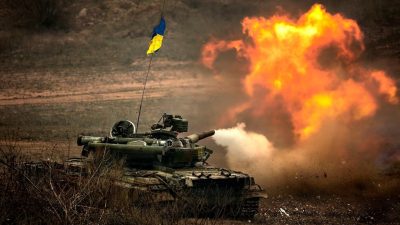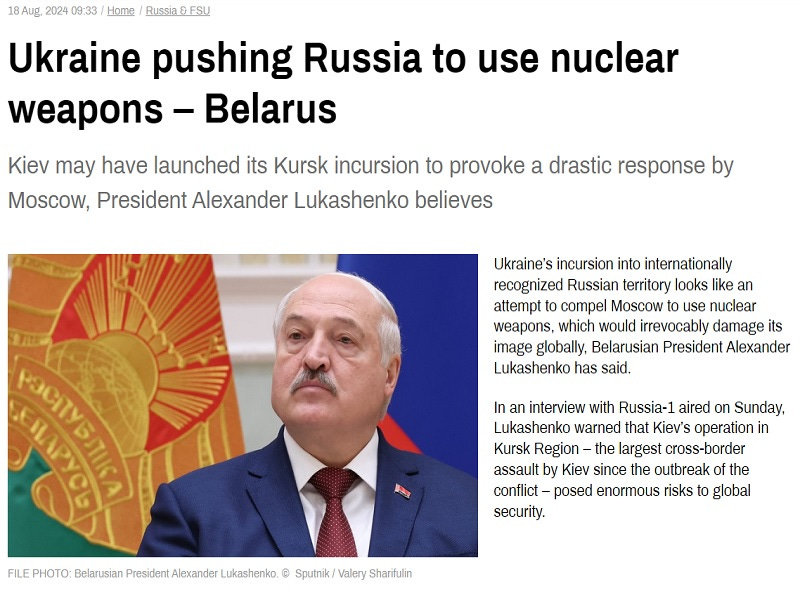Why Might Ukraine Want Russia to Use Nuclear Weapons?

This could lead to immense pressure upon Russia’s Global South partners to distance themselves from it and might also result in American retaliation against Russian forces inside of Ukrainian-claimed territory, both of which could reshape the conflict’s dynamics in Kiev’s favor and stave off its defeat.
Belarusian President Alexander Lukashenko warned on Sunday in an interview with leading Russian media that
“Such escalation on the part of Ukraine (by invading Kursk) is an attempt to push Russia to asymmetric actions. Well, let’s say to use nuclear weapons. I know for sure that Ukraine would be very happy if Russia or we used tactical nuclear weapons there. They will applaud it. Then, probably, we would hardly have allies left. In general, there would be no even sympathetic countries left.”

That sounds absurd on the surface, but it actually makes a lot of sense if one thinks more deeply about it. The use of nuclear weapons is taboo because of the physical and environmental damage that they cause. There are also credible fears that they’d lead to one’s nuclear-armed adversaries retaliating in a tit-for-tat fashion, thus rapidly climbing the escalation ladder to the brink of World War III. Nevertheless, several states still retain nuclear weapons for deterrence purposes in line with their respective doctrines.
As regards Russia’s, they can be employed in the event of a large-scale conventional attack that threatens the existence of the state, among other conditions. That hasn’t yet happened in the Kursk context, but the hypothetical scenario of that region or another being completely captured by Ukraine might be deemed by some decision-makers as meeting the criterion depending on how rapidly the front lines collapse. To be clear, there’s no credible indication that anything of the sort will unfold.
Nevertheless, Ukraine might capitalize upon its attack there by striking the nearby nuclear power plant. A top Russian military journalist had earlier warned that “[Ukraine] plan[s] to strike the storage sites of spent nuclear fuel of a nuclear power plant” in either Kursk or Zaporozhye. This then prompted the Russian Defense Ministry to officially declare that “tough military and military-technical countermeasures will be taken immediately” in that event.
Russian Foreign Ministry spokeswoman Maria Zakharova said that such strikes against those targets “could result in a large-scale technogenic catastrophe in Europe”, not to mention in the Russian heartland if the Kursk Nuclear Power Plant melts down in the aftermath. These combined conventional (invasion) and unconventional (de facto dirty bomb) attacks could push Russian decisionmakers closer to seriously considering the use of tactical nuclear weapons in response as a last resort out of self-defense.
Whether dropped inside of Russia’s own borders or Ukraine’s, they’d send a political shockwave across the world due to breaking the previously mentioned taboo, which could indeed lead to there being “no even sympathetic countries left” in support of Russia barring a few like North Korea. China and India would be under immense pressure to distance themselves from Russia, not just by the West, but also for appearance’s sake since they wouldn’t want to legitimize the use of nuclear weapons by their rivals.
Reports have also swirled that the US might conventionally retaliate against Russian forces inside of Ukrainian-claimed territory if nuclear weapons are used there, thus placing their proxy war on a direct path to World War III if that happens. Ukraine is still losing to Russia despite its sneak attack in Kursk so its leadership might have calculated, however “irrationally” it seems to objective observers, to provoke Russia into raising the stakes to that level.
It’s this escalation sequence that Lukashenko likely had in mind when warning that Ukraine wants Russia to use nuclear weapons, which could hypothetically occur if it completely captures a Russian region and/or is responsible for a nuclear catastrophe through its attacks against Russian nuclear power plants. The first probably won’t happen since their offensive appears to have been halted, while the second is entirely in Ukraine’s hands, so it’s incumbent on the West to do its utmost to stop them from doing this.
*
Click the share button below to email/forward this article to your friends and colleagues. Follow us on Instagram and Twitter and subscribe to our Telegram Channel. Feel free to repost and share widely Global Research articles.
One Month Before Global Research’s Anniversary
This article was originally published on the author’s Substack, Andrew Korybko’s Newsletter.
Andrew Korybko is an American Moscow-based political analyst specializing in the relationship between the US strategy in Afro-Eurasia, China’s One Belt One Road global vision of New Silk Road connectivity, and Hybrid Warfare. He is a regular contributor to Global Research.
Featured image source

